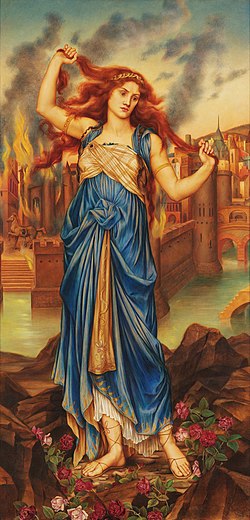Cassandra


Cassandra or Kassandra (Greek: Κασσάνδρα, also 'Alexandra is pretty') was a person in Greek mythology. She was the daughter of King Priam of Troy and Hecuba, and twin sister of Helenus. She was famous for her prophesies of bad events.
The god Apollo gave her the gift of prophecy so that she would love him, but Kassandra did not want him. This made Apollo angry, but he could only change his gift and not take it away. So he made it that Kassandra could only foresee bad things, and that no one would ever believe her.
In the Trojan War Kassandra knew of the trick with the Trojan Horse, but no one believed her, and so Troy was destroyed. After the Trojan War she became a slave of Agamemnon. She warned him that his wife Klytaimnestra would kill him. But he would not believe her, and so Agamemnon was killed, and Kassandra shortly after him.
There is a work called Alexandra by Lykrophon. The poet is only known through this work which was done between 196 and 190 BC. The work has 1474 lines, which are done in jambic trimeters. This is what most Greek tragedies were written in.
Cassandra Media
Woodcut illustration of Cassandra's prophecy of the fall of Troy (at left) and her death (at right), from an Incunable German translation by Heinrich Steinhöwel of Giovanni Boccaccio's De mulieribus claris, printed by Johann Zainer at Ulm ca. 1474.
"Cassandra and Ajax" depicted on a terracotta amphora, circa 450 BC
Cassandra puts herself under the protection of Pallas, Aimé Millet (1819–1891), Tuileries Garden, Paris
| Wikimedia Commons has media related to Lua error in Module:Commons_link at line 62: attempt to index field 'wikibase' (a nil value).. |


